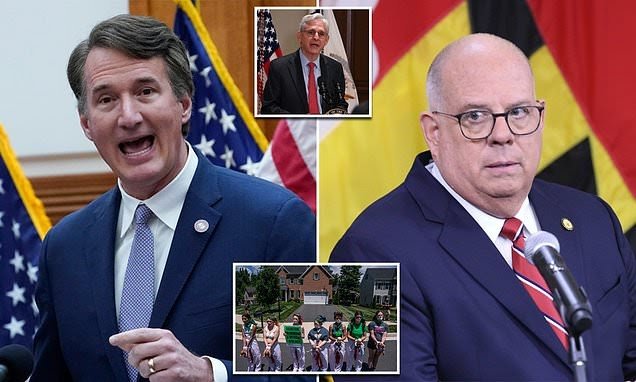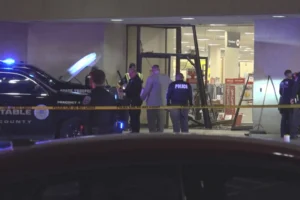Supreme Court marshal asks Maryland, Virginia officials to protect justices’ homes

The marshal of the U.S. Supreme Court has asked Maryland and Virginia officials to step up the enforcement of laws she says prohibit picketing outside the homes of the justices who live in the two states.
“For weeks on end, large groups of protesters chanting slogans, using bullhorns, and banging drums have picketed Justices’ homes,” Marshal Gail Curley wrote in the Friday letters to Maryland Gov. Larry Hogan, Virginia Gov. Glenn Youngkin and two local elected officials.
Curley wrote that Virginia and Maryland laws and a Montgomery County, Maryland, ordinance prohibit picketing at justices’ homes, and she asked the officials to direct police to enforce those provisions.
Justices’ homes have been the target of protests since May, when a leaked draft opinion suggested the court was poised to overturn the landmark 1973 Roe v. Wade case that legalized abortion nationwide.
The protests and threatening activities have “increased since May,” Curley wrote in a letter, and have continued since the court’s ruling overturning Roe v. Wade was issued last week.
“Earlier this week, for example, 75 protesters loudly picketed at one Justice’s home in Montgomery County for 20-30 minutes in the evening, then proceeded to picket at another Justice’s home for 30 minutes, where the crowd grew to 100, and finally returned to the first Justice’s home to picket for another 20 minutes,” Curley wrote in her letter to Montgomery County Executive Marc Elrich. “This is exactly the kind of conduct that the Maryland and Montgomery County laws prohibit.”
In her letter to Jeffrey McKay, chairman of the Fairfax County Board of Supervisors, she said one recent protest outside an unspecified justice’s home involved dozens of people chanting, “no privacy for us, no peace for you!”
Curley’s request came about a month after a California man was found with a gun, knife and pepper spray near the Maryland home of Supreme Court Justice Brett Kavanaugh after telling police he was planning to kill the justice. The man, Nicholas John Roske, 26, of Simi Valley, California, has been charged with attempting to murder a justice of the United States.
Youngkin and Hogan, both Republicans, have each previously expressed concerns about the protests. In May, they sent a joint letter to Attorney General Merrick Garland asking for federal law enforcement resources to keep the justices safe and enforce a federal law they said prohibits picketing with the intent to influence a judge.
“A month later, hours after an assassination attempts on Justice Kavanaugh, the Department of Justice finally responded (to our letter), declining to enforce the laws,” Hogan spokesperson Michael Ricci wrote in a statement Saturday.
“Now a different federal official is writing to us with conflicting information,” Ricci said.
Ricci said that the governor has directed state police to “further review enforcement options that respect the First Amendment and the Constitution.” He also said that “had the marshal taken time to explore the matter,” she would have learned that the constitutionality of the Maryland statute she cited has been questioned by the state Attorney General’s Office.
In a lengthy statement Saturday provided, Elrich called the marshal’s request “troubling.” Elrich said that if Curley has concerns about security, she should communicate that with Montgomery County officials directly, and “not through the media.”
“In Montgomery County we are following the law that provides security and respects the First Amendment rights of protestors,” Elrich wrote. “That is what we do, regardless of the subject of the protests.”
Christian Martin, a spokesperson for Youngkin, said that he “welcomes the Marshal of the Supreme Court’s request for Fairfax County to enforce state law.”
“The attorney general of the U.S. should do his job by enforcing the much more robust federal law,” Martin wrote.
A spokesperson for McKay didn’t immediately respond to requests for comment.
Youngkin in May pushed for a security perimeter around the homes of justices living in Fairfax County, but McKay rebuffed that request, saying it would infringe on First Amendment protest rights. Youngkin also attempted to create a new felony penalty for certain actions during demonstrations aimed at judges or other officers of a court, which state lawmakers rejected.
The letters from Curley were dated Friday and shared with reporters by a spokesperson for the Supreme Court on Saturday.



